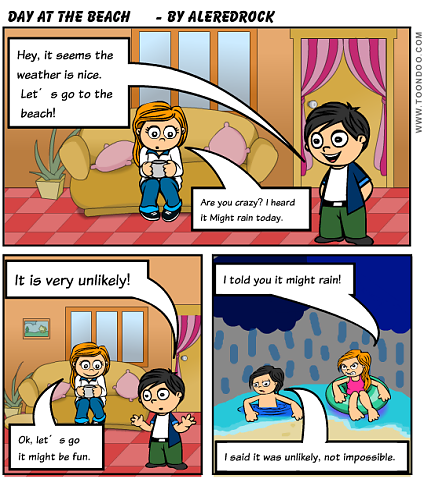
As you have seen before there are many ways to express probability and improbability in English. In previous levels, you have seen how to express it in present and in past. So, I made this blog about this topic so you can have a little review before going to the class.
We have many modal verbs to express probability. As we know some of them can be used for present and others for past.
We use: Must / can’t – to express probability in the present
Structure: modal + infinitive without to
Use: We use must to express that we feel sure that something is true.
Examples:
They must be very rich. Look at the house.
She can’t be ill. I’ve just seen her in the shop and she looked fine.
We use: May / might / could – to express probability in the present
Structure: modal + infinitive without to
Use: We use may or could or might to say that it is possible that something will happen or is happening.
Examples:
They may be arriving tomorrow.
He might be away on holiday.
He could be away on holiday.
Negative forms: The negative of may is may not.
The negative of might is might not.
They both mean that it is possible that something will not happen or is not happening.
IMPORTANT: We DO NOT use could not to express probability.
He might not be offered the job.
I may not pass the exam.
I could not go to the match tomorrow.
Those are some of the ones we use for present. For past we have:
We use: Must / can’t / couldn’t have – to express probability in the past
Structure: modal + have + past participle
Use: We use must have to express that we feel sure that something was true.
Examples:
They must have left early.
He must have already gone.
NOTE: We use can’t have / couldn’t have to say that we believe something was impossible.
He can’t have escaped through this window. It is too small.
She can’t have said that.
She couldn’t have said that.
We use: May / might / could have – to express probability in the past
Structure: modal + have + past participle
Use: We use may / could / might have to say that it was possible that something happened in the past (but we are not 100% sure).
Examples:
He may have missed the bus.
The road might have been blocked.
Negative forms: The negatives are may not have and might not have.
He may not have left yet.
The assistant might not have received his message.
Do you remember a little more now about this topic? Remember there are many more ways to express probability in both present and past in English. These are some of the most common ones. A language is not an exact science, so remember there are exceptions and things that may change or differ.
Taken and adapted from: http://speakspeak.com/resources/english-grammar-rules/modal-verbs/past-probability-must-have-cant-have-couldnt-have

0 Comentarios